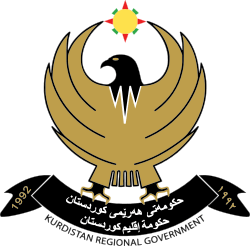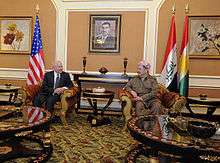Foreign relations of Kurdistan Region
 |
|---|
| This article is part of a series on the politics and government of Iraqi Kurdistan |
Relations of Kurdistan Region of Iraq with foreign states and organizations are conducted by the Kurdistan Regional Government (KRG). Political stability and a rapidly developing economy have given the KRG the opportunity to pursue a foreign policy independent from the central government's. The KRG's primary body for directing its foreign affairs is the Department of Foreign Relations (DFR). The DFR's foremost objectives are to raise the global profile of the Kurdistan Region, improve the Region's international ties with various governments and international organizations, and present emerging business opportunities in the Kurdistan Region to regional and international actors.[1]
The KRG's foreign policy vision has paved the way for the establishment of various diplomatic representations in Kurdistan. A total of 32 countries have a diplomatic presence in Erbil, with Canada, India and Pakistan recently announcing plans to establish diplomatic missions. Multinational bodies, including the EU, UN, ICRC, JICA, and the KOICA also have offices in Southern Kurdistan. The KRG's presence abroad has grown significantly since 2007. Currently the KRG has representative offices in 14 countries.[1]
Department of Foreign Relations
The Kurdistan Regional Government (KRG) established the Department of Foreign Relations (DFR) in September 2006 to conduct relations with the international community. Today, the DFR is an integral part of the government, with a wide ranging portfolio of responsibilities. DFR is headed by Foreign Minister Falah Mustafa Bakir from 2006. The KRG Department of Foreign Relations is mandated to promote the interests of the Kurdistan Region and its people in regard to relations with the international community and in accordance with the Region's legislation and the Constitution of Iraq.
The key responsibilities of the department include:
- Strengthening bilateral relations with the international community
- Promoting trade, investment, tourism and institutional ties
- Supervising the KRG's offices overseas
- Liaising with the diplomatic community in the Kurdistan Region
- Organising the visits of political and economic delegations to the Kurdistan Region
- Coordinating and organising KRG relations with the Iraqi Ministry of Foreign Affairs and Iraqi embassies abroad
- Conducting and supporting activities that enhance the image of the Kurdistan Region
- Communicating between official KRG institutions and the international community
- Providing legal and authentication services to the people of the region and its citizens abroad
Bilateral relations
.svg.png)
Europe

.jpg)
India
There has been limited diplomatic relations between India and Iraqi Kurdistan. India purchases Kurdish crude oil sold through Turkish companies. Several Indian citizens work in Iraqi Kurdistan. Many Kurds travel to India for educational or medical purposes. In July 2014, Hemin Hawrani, head of the Kurdistan Democratic Party's international relations wing, told The Hindu that he hoped for deeper political and economic ties with India, describing the country as "an important partner". Hawrani also expressed his desire to see the Indian government open a consulate in Erbil, and invited Indian companies to invest in Kurdistan.[13] In November 2014, the Indian government sent special envoy Ambassador Suresh K. Reddy to visit Kurdistan and meet Kurdish government officials. Reddy stated that India "fully supports the Kurdistan Region during this difficult time", and expressed confidence in the Kurdish government and the Peshmerga forces to preserve the stability and security of the region. The Ambassador also praised the role of Peshmerga forces in fighting ISIL, and announced that the Indian government would open a consulate in Kurdistan.[14]
Israel
In 2004 was reported about the meetings of Israeli officials with Kurdish political leaders when Massoud Barzani, Jalal Talabani and the former Israeli Prime Minister Ariel Sharon publicly confirmed the good relations of Israel and Iraqi Kurdistan.[15] The President of the Iraqi Kurdistan, Massoud Barzani answered a question while visiting Kuwait in May 2006 about the Kurdish–Israeli relationship: "It is not a crime to have relations with Israel. If Baghdad established diplomatic relations with Israel, we could open a consulate in Erbil." In a policy address in 2014, Israeli Prime minister Benjamin Netanyahu supported the establishment of an independent Kurdish state. He said: "The Kurds are a fighting people that have proven political commitment and political moderation, and they're also worthy of their own political independence."[16]
Korea
Kurdistan and South Korea share strong diplomatic and economic relations as well as military support from the Korean Armed Forces. The Zaytun Division (Korean: 자이툰 부대; Kurdish: Tîpa Zeytûnê) was a Republic of Korea Army contingent operating in Kurdistan from September 2004 to December 2008. An additional 2,200 troops (mostly engineers) were deployed to Erbil in the Kurdish Autonomous Region of Northern Iraq by early September 2004 and were grouped with the humanitarian troops who were relocated from Southern Iraq. The combined unit consisted of 2,800 soldiers. Another 800 soldiers were dispatched to reinforce the existing troops in Erbil in November 2004, thus increasing the size of South Korea's contingent to 3,600.[17][18][19]
The Republic of Korea has a Consulate in Erbil that opened in 2004, the current Head General is Mr. Park Young-Kyu.[20]
Syria
Turkey
The best example of the Kurdistan Region's evolving relations with its neighbors is its relationship with Turkey. Flourishing trade between the two, an influx of Turkish investment, and energy agreements have paved the way for increasing geopolitical cooperation, and helped overcome decades of tension. This expanding partnership, built upon mutual economic interests, was symbolized by the visit of Turkish Prime Minister Tayyip Erdogan to the Kurdistan Region in March 2011, the first such visit by a Turkish leader. Increasing trade volumes between Turkey and Kurdistan ($8.4 billion in 2012) empirically demonstrate the importance of this developing relationship.[1] Past tensions have been supplanted by a new energy partnership and Turkey seems far less worried about the prospect of an independent Iraqi Kurdistan. In May 2012, Turkey and the Kurdistan Regional Government cut a deal to build one gas and two oil pipelines directly from Kurdish-controlled northern Iraq to Turkey without the approval of Baghdad, taking the rapprochement started between the two in 2009 one step further.[21]
Consulate General of Turkey in Erbil was established in March 2010.[22] Iraqi Kurdistan does not yet have a representative office in Turkey.
United States
Currently the United States has official policy towards the Kurdistan Regional Government of Iraq. US Kurdish policy starting initially with "contacts" to a covert "relationship" and finally to an overt "institutionalized relationship" embodied in an official US Kurdish policy. The change of US interaction with the Kurds from humanitarian assistance to strategic partnership as a non-state ally and an asset is testimony to the enhanced role of the Kurdistan Region in the international relations of the Middle East.[23] Deepening KRG–US economic relations was supported by establishment of the United States Kurdistan Business Council (USKBC) in April 2012. In the same month President of Kurdistan Region, President Masud Barzani, visited Washington, D.C. and met with President Barack Obama and Vice President Joe Biden.[24]
The Consulate General of the United States in Erbil was established in July 2011.[24] Iraqi Kurdistan have a representative office in the United States from February 2007.[25]
Relations with international organisations
Iraqi Kurdistan holds 'member' or 'observer' status in only one international organisation.
| International organisation | Status | Representation | Application date | Admission date | Notes |
|---|---|---|---|---|---|
| member | Kurdistan Democratic Party and the Patriotic Union of Kurdistan | 11 February 1991 | Iraqi Kurdistan is founding member of the UNPO. | ||
Participation in international sports federations
Iraqi Kurdistan holds 'member' status in two international sports federations.
| International organisation | Status | Representation | Application date | Admission date | Notes |
|---|---|---|---|---|---|
| N.F.-Board | member | Iraqi Kurdistan Football Association | December 2008 | In 2008, an Iraqi Kurdistani team participated for the first time in the Viva World Cup. Iraqi Kurdistan hosted Viva World Cup in 2012 and won it. | |
| CONIFA | member | Iraqi Kurdistan Football Association | June 2013 | In May 2016, an Iraqi Kurdistan team will participate in the ConIFA World Football Cup hosted by Abkhazia. |
See also
References
- 1 2 3 "Overview: Kurdistan Region of Iraq". Invest in Group. Retrieved 2014-07-27.
- ↑ "Armenian, Iraqi Kurdish PMs Discuss Closer Business Ties". Retrieved 29 March 2018.
- 1 2 3 4 5 6 7 8 9 10 11 12 13 14 15 16 17 "Current Foreign Representations in the Kurdistan Region". Department of Foreign Relations - Kurdistan Regional Government. Retrieved 30 July 2017.
- 1 2 3 4 5 6 7 8 9 10 11 12 13 14 15 16 17 18 "KRG offices abroad". Department of Foreign Relations - Kurdistan Regional Government. Retrieved 30 July 2017.
- ↑ "Bulgaria to Open Consulate in Erbil". iraq-businessnews.com. 1 December 2014. Retrieved 30 July 2017.
- ↑ "The Croatia Ambassador to Iraq visited Erbil Chamber". Erbil Chamber of Commerce and Industry. 15 November 2016. Retrieved 15 August 2017.
- ↑ "Finland's training contributes to troops' capabilities in Iraq". 25 April 2017. Retrieved 18 August 2017.
- ↑ "Iraq". Ministry of Foreign Affairs of Greece. Retrieved 1 August 2017.
- ↑ "President". Kurdistan Region Presidency. Retrieved 9 August 2017.
- ↑ "Pope Benedict commends President Barzani for promoting religious tolerance". Kurdistan Regional Government. 24 February 2011. Retrieved 9 August 2017.
- ↑ "President Barzani Meets Pope Francis at the Vatican". Kurdistan Region Presidency. 31 May 2014. Retrieved 9 August 2017.
- ↑ "Slovenia sending up to 15 inspectors to Iraq". The Slovenia Times. 3 February 2016. Retrieved 18 August 2017.
- ↑ http://www.thehindu.com/news/international/world/kurdish-leadership-calls-for-better-india-ties/article6170941.ece
- ↑ http://dfr.gov.krd/a/d.aspx?l=12&a=44267
- ↑ "Israelis 'using Kurds to build power base'". The Guardian. 2004-06-21. Retrieved 2013-01-12.
- ↑ "Netanyahu expresses support for Kurdish independence". Los Angeles Times. 2014-06-29. Retrieved 2014-06-30.
- ↑ http://english.chosun.com/w21data/html/news/200602/200602240023.html
- ↑ "위문편지". 2006-07-21. Archived from the original on 23 October 2005. Retrieved 2017-10-17.
- ↑ http://english.chosun.com/w21data/html/news/200411/200411070003.html
- ↑ "Loading site please wait..." www.dfr.gov.krd. Retrieved 2017-10-17.
- ↑ "Turkey's KGR energy partnership". Foreign Policy. 2013-01-29. Retrieved 2014-07-27.
- ↑ "Turkish Consulate General in Erbil". MFA of Turkey. Retrieved 2014-07-27.
- ↑ "The Kurds and US Foreign Policy: International Relations in the Middle East since 1945". Insight Turkey. 2011. Retrieved 2014-07-27.
- 1 2 "KRG-US Relations". Kurdistan Regional Government. Retrieved 2014-07-27.
- ↑ "KRG office in DC". Kurdistan Commentary. 2008-11-28. Retrieved 2014-07-27.